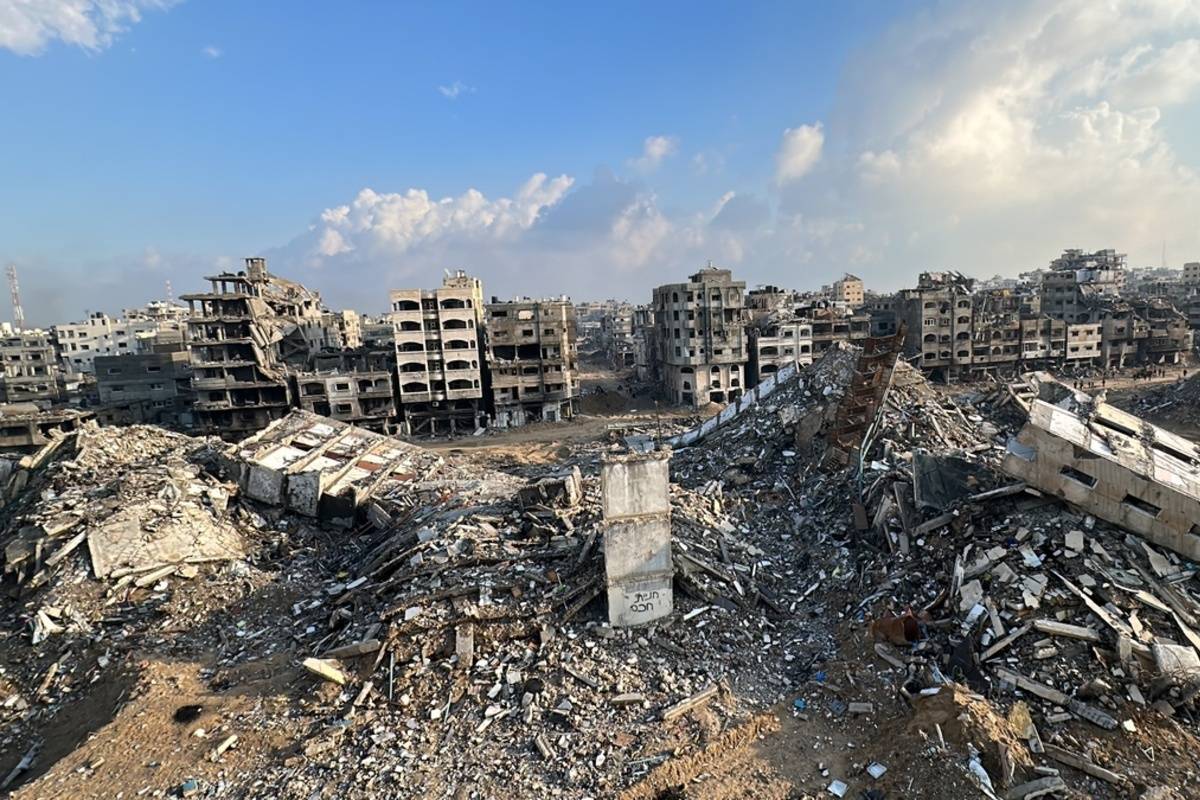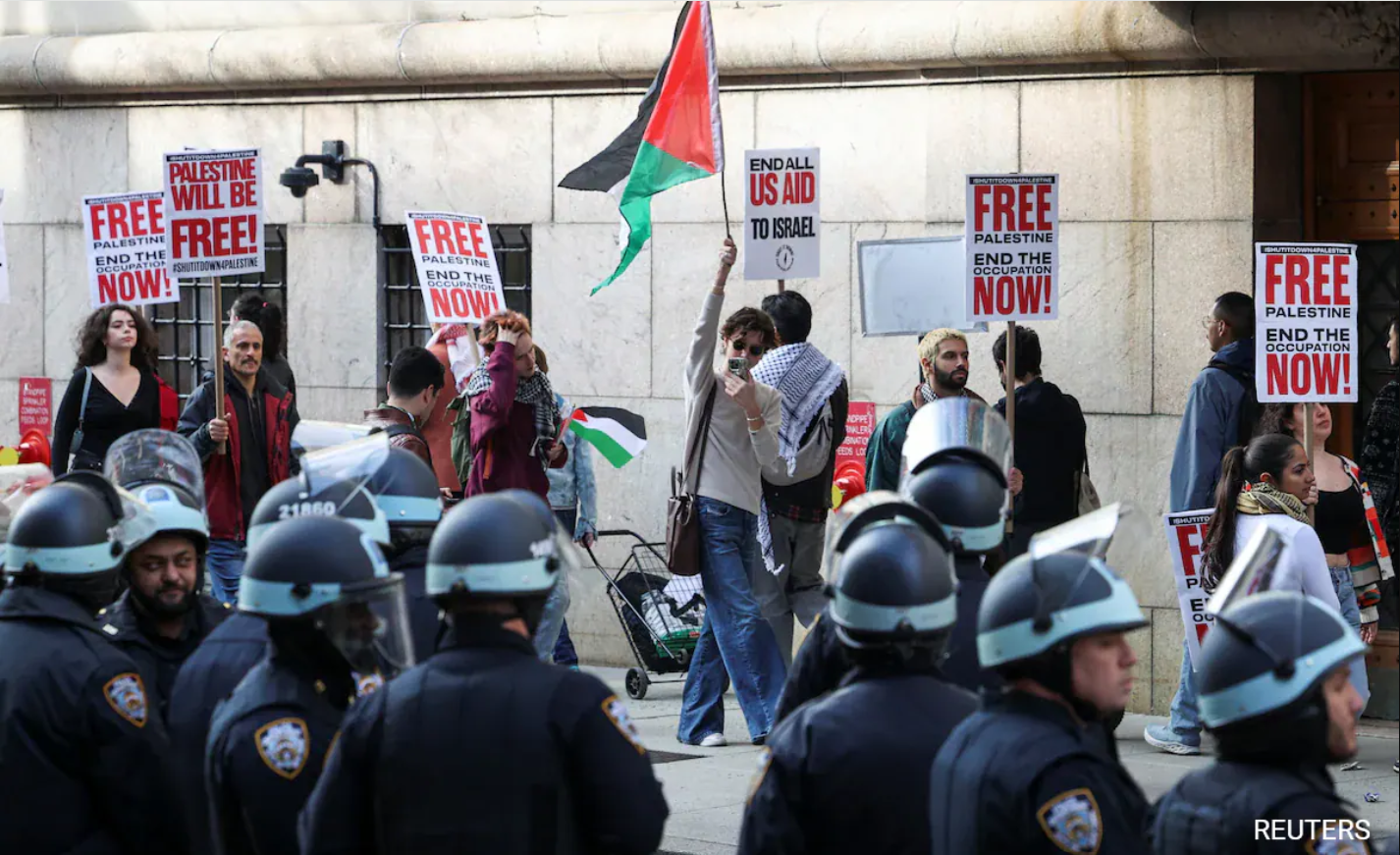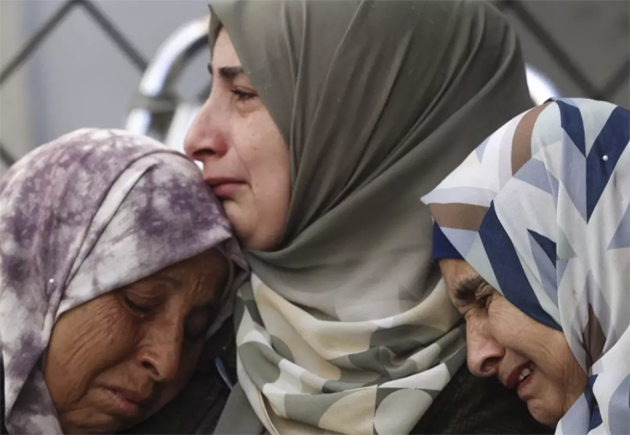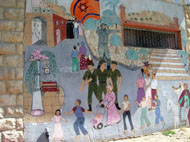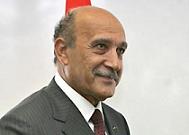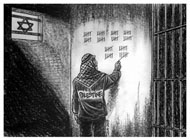As one can see from the recent Annapolis summit, the subject of Gaza has recently become relegated to private discussion rooms. Its mildest utterance in the political sphere is often met with indifference and expressionless faces, as if acknowledging these Palestinians in the 360km2 enclosed prison is taboo. Gaza has plunged into the abyss of silence - an unspoken evil whose neglect is almost demanded and expected.
Last Monday, in one of these private discussion rooms at al-Quds University in Abu Dis, a panel of legal experts gathered to speak about International Humanitarian Law [IHL] and how it is being implemented / overlooked regarding the current situation in Gaza.
The audience was welcomed with an introduction given by the Dean of the Legal department at al-Quds University but the most apt precursor to the presentations came not from a speech but from the absence of one. In what was an ironic example of movement restrictions imposed on Gaza, forum chair and Diakonia representative, Grietje Baars informed the audience that Iyad Nasr, the communications advisor and trainer at the International Committee of the Red Cross [ICRC] in Gaza set to speak that day, could not attend as he was refused a permit out of Gaza by the Israeli authorities.
Of the three panelists remaining on this joint AIDA – Diakonia forum, Sari Bashi and Fatmeh al-Ajou, representatives from the legal centers Gisha and Adalah, addressed the humanitarian situation in Gaza with respect to the difference between Israeli obligations to Gaza as stated in IHL and the Israeli perspective on what their role is in Gaza. In addition they evaluated the effect the illegal, seriously destructive and crippling Israeli sanctions will have on the innocent, beleaguered Palestinian people in the future.
In what was an extremely eloquent and professionally executed talk, Sari Bashi began with the proclamation of Gaza as “hostile territory”. This appellation, which was adopted by the Israeli government in September of this year, was endorsed and accepted by the Israeli High Court. This signaled, according to Ms. Bashi, an end to IHL as a tool for discussion. Instead, Israel has continued on its path to seek credence and legitimacy in absolving themselves of responsibility following their withdrawal from Gaza in 2005. Israel has therefore replaced obedience to IHL with an unacceptable and inadequate degree of moral standard.
Ms. Bashi adamantly asserted that the monopoly Israel enjoys on the ground greatly contradicts and demands more than their laissez faire stance of extending responsibility just as far as moral and selfless human interest. The executive director of Gisha emphasized that Israel still plays a mammoth role in Gaza and therefore has an obligation under International Law to ensure that the occupied people are not oppressed. She referred to three specific aspects of Israeli control: borders, population registry and tax.
Israel controls the sea, the airspace and the all the crossings in and out of Gaza. Following Hamas’ seizure of Gaza, Israel closed all the border crossings into Gaza and cut off supplies from reaching the coastal strip. As a result, 85% of factories have closed down and those which are running are operating at 20% of their capacity; 90% of construction has been halted due to a lack of cement; there is 75% unemployment and rising inflation. Although Rafah crossing, between Gaza and Egypt, is administered by the PA and EU monitors on the Gaza side, the Israelis control the transportation of the monitors to and from the crossing and have a veto over its closing. Not surprisingly then, after Hamas took over, Israel shut the Rafah crossing isolating thousands of people on both sides and leaving them to live in dreadful conditions.
In terms of the population registry, Israel also decides who is a resident of Gaza and whether a new born child is issued an ID or not. Of course Hamas and Fatah can issue the family with an ID but this is pointless as Israel is the border authority.
After the Oslo Accords, Israel was allocated control of gathering Palestinian tax and customs payments. However, from Hamas winning the elections in March 2006 until July 2007, Israel kept these payments which when amalgamated amount to half of the Palestinian Authority’s annual budget. Israel also erased the customs code used to clear goods for Gaza which means that Palestinians in Gaza can only use whatever is already available or what is donated to them by humanitarian organizations.
How can Israel claim to have no responsibility in Gaza when they essentially have their hands choking the entry / exit points of Gaza? Ms. Bashi continued that identifying Gaza as “hostile” has further acted as a catalyst for crises with major banks, such as Hapoalim, shutting down due to the “unpredictable” and “dangerous” nature of the territory. Even if Israel no longer played a role in the administration of Gaza, after 40 years of occupation, economic turmoil and restrained movement, the occupier would have an obligation to face the implications of their occupation and aid the area in recuperating itself and preventing it from plunging into further disaster.
In the opinion of Sari Bashi and Fatmeh al-Ajou, the Israelis citing security reasons for their harsh treatment and blatant abandonment of their duties to adhere IHL are highly dubious and tenuous. There was a petition issued to the High Court concerning the need for 26 people to leave Gaza for medical reasons. Prior to the hearing, a one and a half year old had been refused entry to Israel for chemotherapy and subsequently become too ill to travel to the point where her parents wished her to spend her last days at home. The High Court rejected the petition, void of legal reasoning. They responded that it was not their obligation but as a purely humanitarian gesture they would allow medical attention to those with “life threatening” cases. Those who suffer from ailments not terminal and are therefore categorized as “quality of life” patients, meaning they would still be able to live but whose illness would only affect their quality of life, would be prohibited from entering. The court recognized the difficulty in defining and categorizing individual’s injuries / illnesses on a priority scale of importance but supported their decision by contesting that they are not “standing at Erez exposed to terrorism” and must only expose the Israeli soldiers to those dangers which are deemed essential.
In closing the representatives from the two legal centers concluded that Israel does not operate within the framework of international law. Their very neglect of international law, maintaining the very minimal humanitarian standard is in fact a tool used to collectively punish the Palestinians in Gaza in order to force a regime change. There is no legal explanation for these violations of human rights, which most recently include Israel forbidding sufficient fuel and electricity supplies into Gaza.
Gareth Gleed, a legal researcher for the human rights organization al-Haq, firstly reiterated points expressed by his colleagues concerning collective punishment and regime change. Mr. Gleed reinforced the notion of collective punishment quoting Article 33 of the 1949 IV Geneva Convention which states that “no protected person may be punished for an offence he or she has not personally committed. Collective penalties and likewise all measures of intimidation or of terrorism are prohibited”. Additionally, in reference to Israel attempting to influence regime change, Mr. Gleed referred to Article 31 of the same accord which stipulates that “no physical or moral coercion shall be exercised against protected persons”.
Although supporting the comments made previously, this coherent and concise presentation focused on international involvement in the human rights situation as well as mentioning the West Bank perspective which questions the presupposed perception that while Gaza is isolated, the West Bank is experiencing a period of increased prosperity.
Mr. Gleed declared that just as in Gaza, Israel is striving to create pockets of legal regions where nothing applies to Palestine as a whole. The UN Charter states that a people have a right to access their natural resources and have a choice in their political and economic progression. Under Israel, this right is being revoked as the occupier disseminates the very structure that hopes to exercise human rights. The al-Haq researcher noted that while there are separate entities in Gaza and the West Bank, there are also secluded areas which operate under different rules and are treated differently by Israel. These are areas such as the Jordan Valley and east Jerusalem which are considered regions in Area C, the fully Israeli controlled section of the West Bank [approximately 70% of the land] allocated to them under the Oslo Accords.
Even though the West Bank is divided in such a way where Palestinians are unable to access 38% of the land with the existence of illegal settlements, checkpoints, roadblocks and roads which are only open to Israeli settlers, the international community is nevertheless dedicated to establishing three commercial zones in Jenin, Jericho and Hebron. Mr. Gleed highlighted that the proposed locations for these commercial centers, which will reportedly improve the economic climate in the West Bank, are in fact locations in Area C. In the opinion of Mr. Gleed, these ventures essentially insinuate that the international community is providing its stamp of approval to entrench the occupation. By sponsoring “projects for peace” they are in fact providing a further “tool for occupation” as the areas in which these centers will reside are under Israeli jurisdiction.
Mr. Gleed recommended that if the international community were in fact serious about ushering in peace and security, they should address the “fundamental violations inherent in [the Israeli] occupation” - the violations are a legal point, not a political one and contrary to popular belief the two are mutually exclusive.
If the international community actively partake in these projects, in a third party capacity, to increase Palestinian prosperity in the hope of establishing a viable state, they will be accepting the existence of Israeli settlements in the West Bank and thus be supporting an Israeli imposition which is in direct violation of International Law, a document the international community have signed and sworn to uphold, a law that governs their own independent states and their own legal systems.
The humanitarian situation in Gaza is extremely dire. The coastal area is marking its sixth month anniversary under Hamas rule amidst economic depression and social catastrophe. The people are being denied vital supplies such as fuel and food, prices are rising to extortionate levels, hospitals are becoming dysfunctional, the people are not able to leave and they have been abandoned by the very international law that was created to protect them from these conditions. Gaza has also been discarded by its president and its occupiers. The latter bomb Gaza almost daily and are even contemplating an invasion in a move that further proves that Israel is insistent on wiping their hands of the area and absolving themselves from their obligations as an occupying power. The only crime the people of Gaza committed is that they reside in an area which was seized and is now subsequently governed by an Islamic resistance group which is considered by the bulk of the international community as a “terrorist” organization.
Not only is this the appalling truth but as Mr. Gleed implied, Gaza is not a completely unique instance. With the gradual sectioning of the West Bank into different areas, directed by the path of the wall and Israeli settlements, the commercial centers and the influx of millions of dollars to the West Bank may have more of an adverse effect than expected. Instead of ushering in a thriving economy and advances toward a viable Palestinian state, the commercial centers erected in Israeli authorized areas may further isolate Palestinians from each other, leave them entirely dependent on Israel and place them in a position where Israel will be able to greatly influence their functioning and survival.




